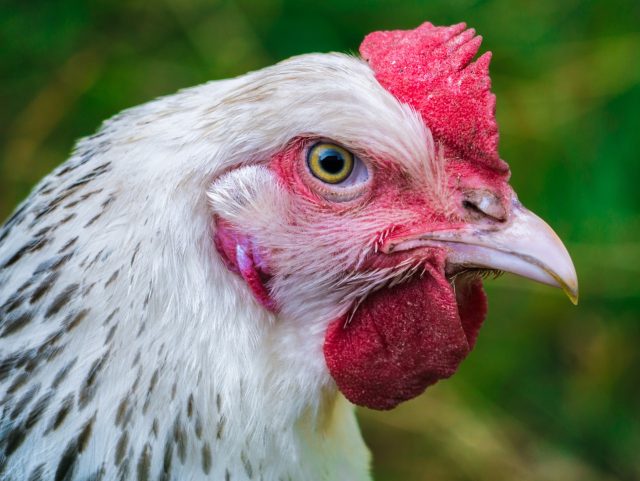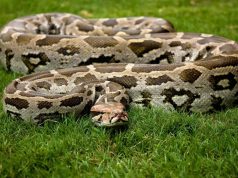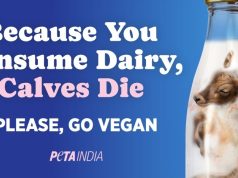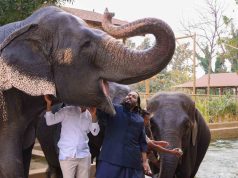“The fate of industrially farmed animals is one of the most pressing ethical questions of our time. Tens of billions of sentient beings, each with complex sensations and emotions, live and die on a production line,” says author Yuval Noah Harari in his New York Times bestseller Sapiens: A Brief History of Humankind.
Choosing to eat eggs or chicken flesh sentences birds to a world of suffering and premature death. Did you know hens are social and intelligent beings who can recognise more than 100 individual faces (even after several months of separation), consider the future, and practice self-restraint for a later reward – a skill that was thought to be exclusive to humans and other primates.
An eyewitness from Anonymous for Animal Rights visited major hatcheries and farms for chickens used for eggs (“layers”) and meat (“broilers”) in Andhra Pradesh and Telangana in 2016 and gave the material to PETA India for a report.
Hens on layer and broiler farms never have the opportunity to mate naturally. Instead, farmers repeatedly artificially inseminate them against their will. At Diamond Group’s broiler farm, the eyewitness found workers without gloves roughly extract semen from male chickens, forcibly drag hens out of their cages, and inject the semen into them using the same syringe over and over. After being raped, the hens are shoved back into the filthy cages, says the report.
Incubation
Instead of allowing hens to incubate their eggs as they would in nature, farmers steal their eggs and hatch them artificially in mechanical incubators. Sakku Group’s large-scale commercial incubators are manually controlled by company officers and have automatic backup systems, but according to workers in the hatchery, temperatures can accidentally surge, causing deformities in the chicks, who are then discarded.
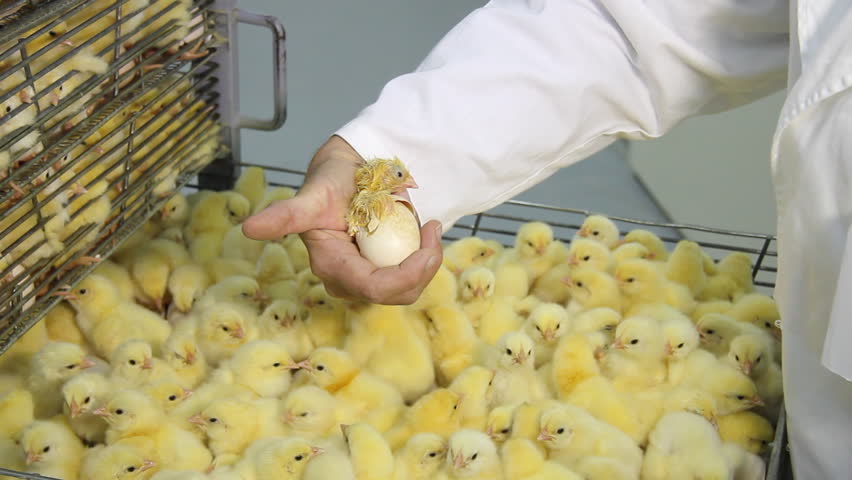 Female chicks in commercial hatcheries never get to meet their mothers. Instead, they’re forced into the same vicious cycle that their mothers and grandmothers endured – they lay eggs until their bodies wear out, and then they’re slaughtered.
Female chicks in commercial hatcheries never get to meet their mothers. Instead, they’re forced into the same vicious cycle that their mothers and grandmothers endured – they lay eggs until their bodies wear out, and then they’re slaughtered.
Battery Cages
Hens used for their eggs are confined to tiny faeces-encrusted wire “battery” cages that are so cramped, the birds can’t even stretch out a wing. Because the cages are stacked, these normally fastidious animals have no choice but to urinate and defecate on one another, causing conditions in which disease can run rampant. In an attempt to prevent illness, farmers commonly pump the animals full of antibiotics.
Debeaking
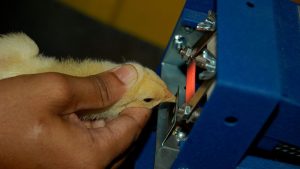 When female chicks who will be used for eggs are just a few days old, workers cut off a large portion of their beak with a searing-hot blade – without giving them any painkillers – to prevent them from pecking each other out of the frustration that’s caused by intensive confinement to small cages.
When female chicks who will be used for eggs are just a few days old, workers cut off a large portion of their beak with a searing-hot blade – without giving them any painkillers – to prevent them from pecking each other out of the frustration that’s caused by intensive confinement to small cages.
At Sakku Group’s layer farm, for example, baby hens go straight from the hatchery into tiny wire cages. The egg industry considers them useless after about 18 months – and during this short lifespan, they aren’t allowed to walk on the ground, fly, or even fully spread their wings. Many birds have difficulty eating or drinking after they’re debeaked.
Killing Baby Chicks
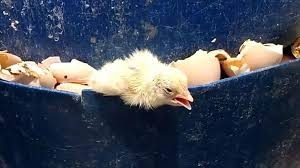 The egg and chicken flesh industries reject male, sick, and deformed chicks and others who are considered undesirable and inhumanely kill them in gruesome ways soon after they hatch.
The egg and chicken flesh industries reject male, sick, and deformed chicks and others who are considered undesirable and inhumanely kill them in gruesome ways soon after they hatch.
Workers at Suguna treat these sentient beings as if they were trash and callously toss them into waste bins that are stacked on top of one another. At SR Group and Diamond Group, they toss live chicks into fires, from which the baby birds try desperately to escape.
SH Group sells rejected chicks to fish farms as food: trucks packed with starving newly hatched birds pull right up to the water, and the chicks – living, dying, and dead – are thrown directly into fish tanks, where they’ll either drown or be eaten alive by fish. Terrified chicks try to escape by hiding under rocks, but workers kick them into the water. Other live chicks at Suguna are thrown into large grinders, along with dead chickens and eggshells. Their ground-up remains are sold as food for other animals.
Forced Moulting
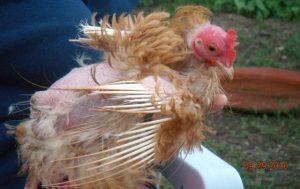 This is a cruel technique that typically involves starving hens in order to shock their bodies into starting another egg-laying cycle. Many hens lose all their feathers and much of their bodyweight, and some even die.
This is a cruel technique that typically involves starving hens in order to shock their bodies into starting another egg-laying cycle. Many hens lose all their feathers and much of their bodyweight, and some even die.
In 2011, the Animal Welfare Board of India (AWBI) ordered all poultry farms in the country to discontinue the cruel practice of forced moulting immediately, labelling it a punishable offence that violates the Prevention of Cruelty to Animals (PCA) Act, 1960. Yet, the practice of moulting continues.
Still craving butter chicken?
Subscribe
 Female chicks in commercial hatcheries never get to meet their mothers. Instead, they’re forced into the same vicious cycle that their mothers and grandmothers endured – they lay eggs until their bodies wear out, and then they’re slaughtered.
Female chicks in commercial hatcheries never get to meet their mothers. Instead, they’re forced into the same vicious cycle that their mothers and grandmothers endured – they lay eggs until their bodies wear out, and then they’re slaughtered.


